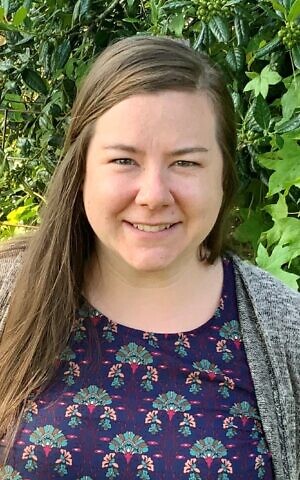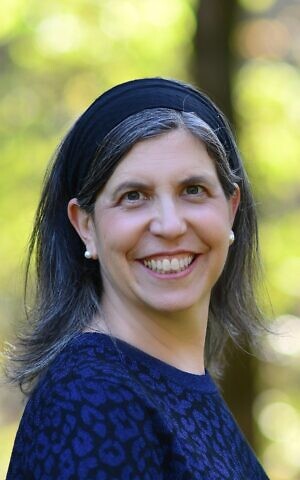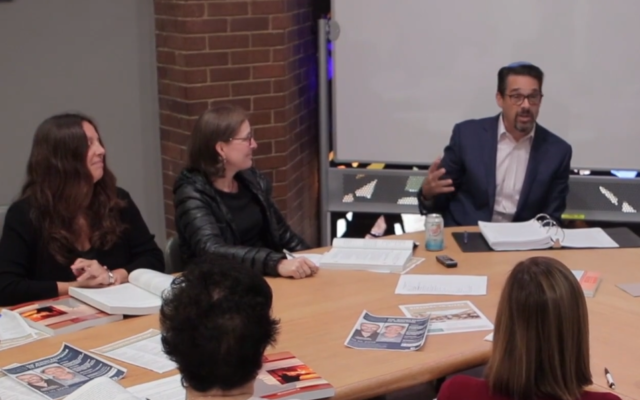Melton Class Modified for Diverse Abilities
Atlanta Jewish community to partner with Melton for broader, modified curriculum that could be marketed internationally.
Good old-fashioned teamwork in the Atlanta Jewish community may result in it becoming a model for educational inclusion, with adult classes being modified for students with disabilities, expanded and offered around the world. This new initiative is appropriately timed during February, the Jewish Disability Awareness, Acceptance & Inclusion Month.
At the beginning of the pandemic, the Marcus Jewish Community Center of Atlanta’s Lisa F. Brill Institute for Jewish Learning was seeking to do something special in the community, said director Talya Gorsetman. “We always partner with synagogues and schools in Atlanta. We’re the only Melton school in town,” she said, referring to the Florence Melton School of Adult Jewish Learning, which engages adult learners in the study of Jewish texts and ideas.
The Greater Atlanta Jewish Abilities Alliance’s Lisa Houben, who is the community inclusion and training coordinator, came up with the idea of modifying a Melton course for adults with developmental disabilities.
“In a real team effort, we asked what parts of the Melton class could be tweaked” for this community, said Annie Garrett, the JAA manager. At the same time, the class had to be virtual due to the pandemic, which actually made it “more accessible” for this group of students who might not drive or have independent mobility.

Garrett introduced Gorsetman to Jay Kessler, a community donor and JAA volunteer, who not only contributed funds to make the class affordable for these students, but also helped to reach out to potential students.
The result was an initial class last fall that included four students with diverse abilities and three other participants who were either parents or caregivers, Gorsetman explained. Entitled “Members of the Tribe: A Virtual Melton Class,” the course offered a modified curriculum designed to include adults of all abilities.
The Temple’s Rabbi Steven Rau taught the first class. The second part of the class, which started in late January, is being taught by Devorah Lowenstein, director of Atlanta Education Associates and a longtime Melton teacher. According to Gorsetman, the class includes 13 students with diverse abilities and four adults without disabilities. The students range in age from 18 to 45.
Rau helped modify the Melton curriculum and is now beginning to work with Melton on a broader curriculum designed specifically for this group of adults. “We are so lucky to have Rabbi Rau as a resource in our community,” Garrett said. “It’s pure luck. He literally wrote a book about Jewish inclusion. He’s a huge key to the success of this.”
Indeed, according to students, the class has been a success. “Taking my first [Melton] class amid the COVID pandemic has been an unexpected highlight during this unique time,” Michelle Simon said in a press release. “I had been interested in taking a Melton class and I’m so glad this opportunity arose where I could take one with my son Kyle. Learning from the diverse members of the class, led by the wonderful Rabbi Rau, has been an unbelievably satisfying experience. My classmates are just so insightful and inspiring. I cannot wait to sign up for the next class.”

Kyle apparently felt similarly. “I think the class is great and so meaningful. I have never done a class like this before and honestly it’s amazing and a great experience.”
Gorsetman said the MJCCA’s Brill institute is now “at the beginning stages of a partnership with the Florence Melton School [at Hebrew University in Jerusalem] to create a curriculum specifically for adults with diverse abilities. The Melton curriculum must be university approved.” Once it is, the specialized curriculum will be marketed worldwide, she added. A faculty guide for the curriculum, on how to teach the class, will also be developed.
“This is starting in Atlanta and is going to be international,” Gorsetman said.
“We can be a model for other communities, which is very exciting,” Garrett said. She also noted that “We’ve all learned more about inclusion” while developing the new educational initiative.
Garrett pointed out that JAA is not a programmatic entity. “We don’t offer direct programs,” she said. “We support our partner agencies.”

However, because of JDAIM, it is promoting a film screening tonight of “6,000 Waiting,” which told the stories of three Georgians with developmental disabilities whose lives have been impacted by the lack and complexity of the state’s Medicaid waiver funding. Hosted by JAA, the screening was targeted primarily toward parents and caregivers. A question-and-answer panel was to follow the event.
A week earlier, on Feb. 18, there was to be a panel discussion via Zoom entitled “Israeli Influence on Disability Inclusion and Awareness.” According to Sierra Weiss, director of academic affairs and Jewish community relations at the Consulate General of Israel to the Southeast, “We will discuss how to make disability accessibility a priority and how we can look to success in Israel for guidance for inclusion practices.”
According to Garrett, “Our goal is to educate and empower our community to speak up.”
- Jan Jaben-Eilon
- Education
- Local
- Jewish Disability Awareness
- Acceptance & Inclusion Month
- Marcus Jewish Community Center of Atlanta
- Lisa F. Brill Institute for Jewish Learning
- Talya Gorsetman
- Florence Melton School of Adult Jewish Learning
- Jewish Abilities Alliance
- Lisa Houben
- Annie Garrett
- Jay Kessler
- Steven Rau
- The Temple
- Devorah Lowenstein
- Atlanta Education Associates
- Inclusion




comments